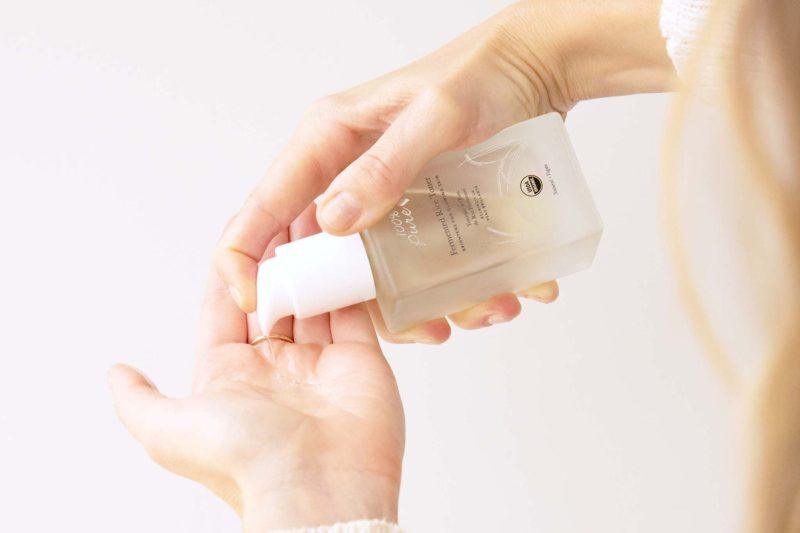Unlocking the Potent Benefits of Astringents in Skincare
Posted on March 10, 2024 Written by: 100% PURE®
Astringents, revered for their pore-tightening and skin-clarifying prowess often grapple with an unjustly tarnished reputation in skincare. Despite their potent benefits, these powerful products face a common misconception of being overly harsh on the skin. The negative perception has led to undermining the goodness of astringents, with users fearing excessive dryness and irritation. However, it’s crucial to recognize the evolving landscape of skincare formulations. Modern astringents, often alcohol-free and enriched with soothing botanicals, aim to preserve efficacy while mitigating harsh effects.
Astringents are skincare products designed to tighten and firm the skin by causing tissue contraction. Distinguishing them from toners and other facial products, astringents typically contain potent ingredients like alcohol or witch hazel, aiming for an immediate and pronounced impact. Unlike toners, which focus on pH balance and preparation, astringents excel in controlling excess oil, refining pores, and providing a temporary skin-tightening effect. While other facial products serve various skincare needs, astringents are specialized for those with oily or acne-prone skin.
The mechanism of astringents involves multiple facets. Firstly, their alcohol content dissolves and removes excess oil from the skin’s surface, making them effective for oil control. Additionally, astringents induce the contraction of skin tissues, visibly reducing pore size and promoting a smoother complexion. Some astringents may influence the skin’s pH balance, potentially restoring acidity.
Astringents offer a range of benefits that contribute to healthier and more radiant skin. Here let’s take a look at some of its amazing effects:
Pore Minimization
Astringents offer a notable benefit in minimizing the appearance of pores, contributing to a smoother skin texture. Through their astringent properties, these skincare products induce the contraction of skin tissues. This tightening effect temporarily reduces the size of pores, creating a smoother and more refined complexion. By toning and firming the skin, astringents contribute to a visually improved and even skin surface.
Oil Control and Acne Prevention
One of the key advantages of astringents lies in their ability to control excess sebum production, making them particularly effective for individuals with oily or acne-prone skin. By dissolving and removing excess oil from the skin’s surface, astringents help prevent clogged pores and reduce the likelihood of acne breakouts. Regular use can contribute to a clearer complexion and promote healthier-looking skin by addressing the root cause of acne.
Enhancing Skin Tone and Texture
Beyond pore reduction and oil control, astringents offer additional benefits for overall skin tone and texture. The astringent action helps in tightening the skin, resulting in a firmer and more toned appearance. Some astringents contain ingredients with skin-soothing properties, promoting a refreshed and revitalized feeling. Regular use of astringents can contribute to an improved overall skin texture, making it feel smoother, softer, and more balanced.
When selecting an astringent, it’s crucial to consider your skin type and choose ingredients that cater to its specific needs. For sensitive skin, opt for natural astringents like witch hazel, known for its gentle yet effective properties. Those with acne-prone skin can benefit from ingredients like salicylic acid, renowned for its ability to unclog pores and control excess oil production. Look for products with soothing components like chamomile or aloe vera to mitigate potential irritation, ensuring a balanced and gentle treatment for sensitive skin.
100% PURE Picks for Natural Astringents
Flower Water Toner: A gentle option with floral extracts, ideal for sensitive skin.
Lavender Niacinamide Pore Minimizer Tonique: Formulated with lavender and niacinamide, effective for refining pores.
Tea Tree & Willow Clarifying Astringent: Suitable for acne-prone skin, featuring tea tree oil for its antibacterial properties.
Fermented Rice Water Toner: Known for brightening and hydrating, suitable for various skin types.
Lavender Tonique: Offers a soothing effect, making it suitable for sensitive skin.
For those with sensitive or dry skin, it’s crucial to steer clear of potential irritants. Avoid astringents with high alcohol content, as they can be overly drying. Additionally, be cautious of fragrances, menthol, peppermint, synthetic dyes, and highly acidic ingredients. Opt for products labeled as hypoallergenic or non-comedogenic to minimize the risk of adverse reactions. Taking a patch-test approach before incorporating a new astringent into your routine can help identify any potential sensitivities and ensure a tailored, skin-friendly choice.
Newsletter Subscribe
for more blog updates and exclusive discounts
When integrating astringents into your skincare routine, optimal application is key for maximizing benefits while preventing potential irritation. Start by cleansing your face to ensure a clean canvas, followed by gentle patting with a clean towel. Applying the astringent once or twice daily is generally sufficient for most skin types, but those with sensitive or dry skin may benefit from less frequent use. Use a cotton pad to gently sweep the astringent across your face, avoiding the eye area, and pay extra attention to areas with enlarged pores or excess oil.
Pro Tip: Always follow up with a broad-spectrum sunscreen during the day, as astringents can increase skin sensitivity to the sun.
Combining astringents with other skincare products requires careful consideration to prevent over-drying or irritation. When selecting complementary products, opt for those with ingredients that synergize rather than conflict. Here are some ingredients you can use with astringents:
Glycerin: Hydrates the skin, preventing over-drying caused by astringents. It helps maintain the skin’s moisture balance, leaving it soft and supple.
Hyaluronic Acid: Known for its exceptional hydration properties, hyaluronic acid helps retain water in the skin, promoting plumpness and reducing the risk of dryness.
Aloe Vera: Renowned for its soothing properties, aloe vera calms and moisturizes the skin. When combined with astringents, it aids in mitigating potential irritation.
Vitamin C: An antioxidant, vitamin C protects the skin from environmental damage, enhances collagen production, and brightens the complexion, complementing the effects of astringents.
Vitamin E: Another powerful antioxidant, vitamin E nourishes and moisturizes the skin while providing additional protection against free radicals and oxidative stress.
Can astringents be used daily, or should they be applied sparingly?
Astringents can be used daily but moderation is the key. However, for those with dry skin, it’s best to use them sparingly rather than daily. This ensures optimal results without risking over-drying or irritation. For individuals with excessively oily skin, a daily application may be more suitable. Adjusting the frequency based on your skin’s needs allows you to maintain a healthy balance.
How quickly can I expect to see results from using an astringent?
The timeframe for noticing results from using an astringent varies based on skin type. Individuals with oily skin may experience quicker improvements, such as reduced oiliness and tightened pores, within a week or two. For those with dry or sensitive skin, changes may take longer to manifest. It’s crucial to monitor your skin’s response, adjusting application frequency accordingly. Patience and consistency are key; while some may see rapid changes, others might require more time.
Are astringents suitable for dry skin, or are they better for oily skin types?
Astringents are typically more suitable for oily or combination skin types. They work by removing excess oil and tightening pores, which may exacerbate dryness in individuals with dry skin. Those with dry skin may want to opt for milder toners or hydrating alternatives to maintain skin moisture.
Can I use astringents if I have sensitive skin?
While individuals with sensitive skin should approach skincare with caution, some astringents are formulated to be gentle and suitable for sensitive skin. Opting for alcohol-free or sensitive skin-specific astringents, conducting a patch test, and consulting with a dermatologist can help ensure a positive experience.
What’s the difference between an astringent and an alcohol-free toner?
Astringents and alcohol-free toners differ in formulation and purpose. Astringents, with higher alcohol concentrations, target excess oil, tighten pores, and cater to oily or acne-prone skin. In contrast, alcohol-free toners provide a milder approach, focusing on pH balance, hydration, and skin preparation without the use of alcohol. Ideal for dry, sensitive, or combination skin, alcohol-free toners minimize the risk of irritation.
Astringents hold transformative potential for improving skin health, offering targeted solutions for individuals grappling with oily skin and enlarged pores. Their unique ability to tighten and refine the skin, coupled with oil-controlling properties, makes them invaluable in achieving a smoother and clearer complexion. As we’ve discussed, the careful selection and integration of astringents into your skincare regimen can lead to remarkable improvements in skin clarity and texture.

